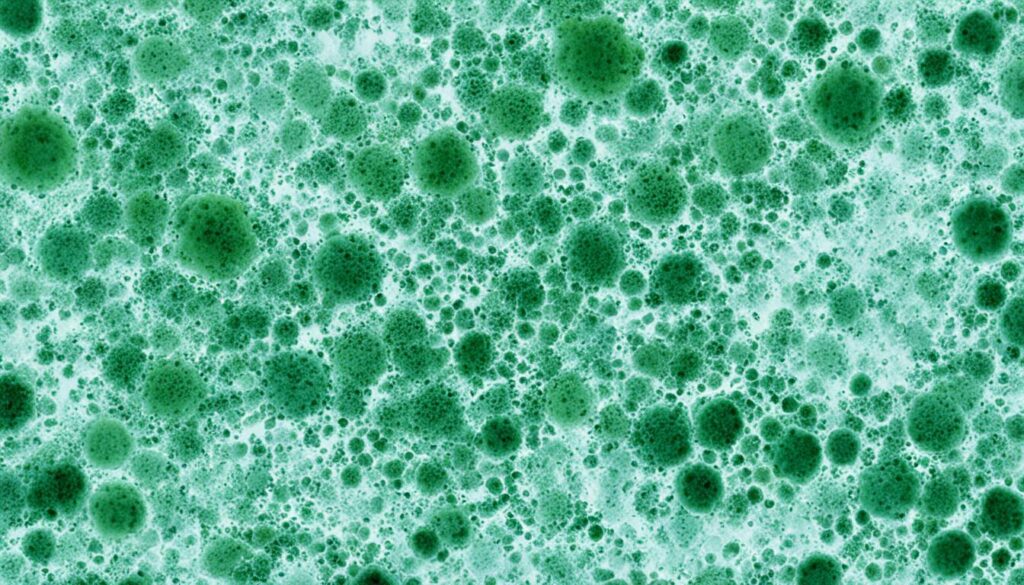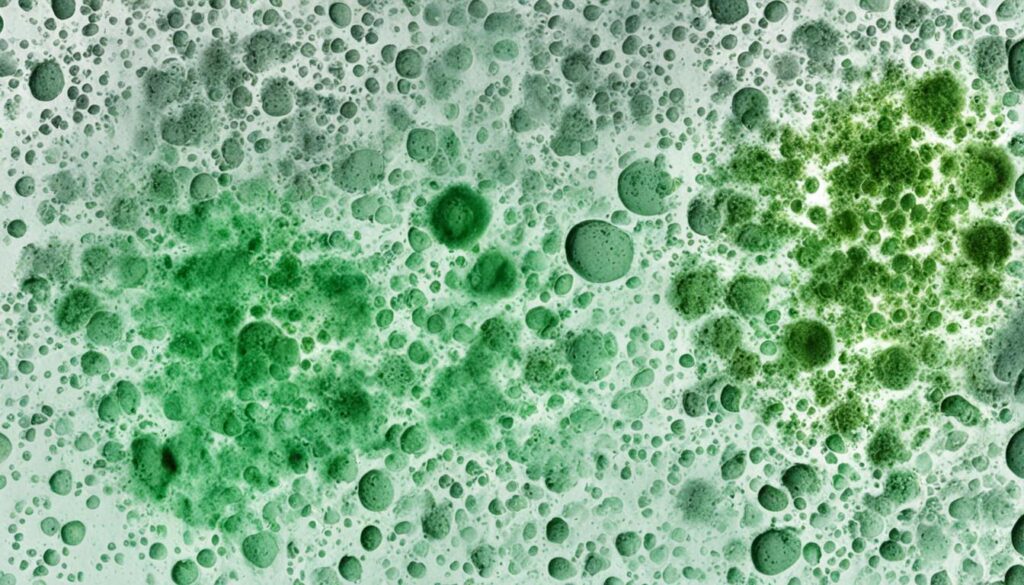
Understanding Mold Poisoning Symptoms
If you’ve ever noticed a musty smell in your home or workplace, it could be a sign of mold growth. While mold might seem harmless, it can actually lead to serious health issues if left unchecked. In this section, we will explore the various symptoms that can occur as a result of mold poisoning. Identifying these warning signs is crucial to protect your health and take appropriate action.
Key Takeaways:
- Mold poisoning symptoms are important to recognize for your overall well-being.
- Common signs of mold exposure can occur in various parts of the body.
- Understanding the symptoms of mold poisoning helps in preventing further exposure.
- Take immediate action if you experience any of the warning signs mentioned.
- Consult a healthcare professional for proper diagnosis and treatment.
Recognizing the Signs of Mold Exposure
In this section, we will discuss the signs that indicate you have been exposed to mold. Mold exposure can lead to various health problems, so it’s important to be aware of these signs and take action if necessary.
Mold exposure can manifest in different ways depending on individual sensitivity. Some common signs to look out for include:
- Allergic reactions: Mold exposure can trigger allergic reactions such as sneezing, itching, watery eyes, and nasal congestion. These symptoms may resemble seasonal allergies, but if they persist in indoor environments or when the seasons change, mold exposure could be the cause.
- Respiratory issues: Mold can irritate the respiratory system, leading to coughing, wheezing, chest tightness, and shortness of breath. Individuals with pre-existing respiratory conditions such as asthma may experience worsened symptoms when exposed to mold.
- Skin rashes: Direct contact with mold or mold-infested materials can cause skin irritation and rashes. These rashes may be itchy, red, and in some cases, may develop into fungal infections.
- Unexplained fatigue: Mold exposure can result in chronic fatigue and persistent tiredness. If you constantly feel fatigued even after getting enough rest, mold exposure could be a contributing factor.
- Headaches: Mold can release volatile organic compounds (VOCs) into the air, which can trigger headaches and migraines in some individuals.
If you are experiencing any of these signs of mold exposure, it’s important to seek medical attention to determine the cause and address any potential health risks. Additionally, identifying and eliminating the source of mold in your environment is crucial to prevent further exposure.
Preventing Mold Exposure
To reduce the risk of mold exposure, take the following preventive measures:
- Control humidity levels in your home by using dehumidifiers and proper ventilation.
- Fix any water leaks or moisture issues promptly.
- Ensure proper ventilation in areas prone to moisture, such as bathrooms and kitchens.
- Clean and dry any water-damaged materials or furnishings within 24-48 hours to prevent mold growth.
- Regularly clean and maintain your HVAC system to prevent mold growth in ducts and filters.
- Use mold-resistant products and materials when remodeling or renovating your home.
By being aware of the signs of mold exposure and taking preventive measures, you can protect your health and create a safer living environment.

Common Mold Poisoning Symptoms
When it comes to mold poisoning, recognizing the symptoms is crucial for early detection and prompt action. Here, we will explore the most common symptoms associated with mold exposure, helping you identify whether you may be at risk.
Mold poisoning symptoms can vary depending on individual sensitivity, duration of exposure, and the type of mold present. It’s important to note that individuals may experience different symptoms, and the severity of these symptoms can also vary.
Here are some of the most frequently reported symptoms of mold poisoning:
- Respiratory issues: Persistent coughing, wheezing, sinus congestion, and shortness of breath.
- Allergic reactions: Itchy or watery eyes, sneezing, nasal congestion, and skin rashes.
- Headaches: Recurrent or worsening headaches, often accompanied by dizziness or lightheadedness.
- Fatigue and weakness: Feeling constantly tired, lacking energy, and experiencing muscle weakness.
- Neurological symptoms: Memory problems, difficulty concentrating, and mood swings.
- Gastrointestinal problems: Nausea, vomiting, diarrhea, and abdominal pain.
- Skin irritation: Itchy skin, redness, and rashes, especially in areas of direct contact with mold.
Seek Medical Attention
If you experience any of these symptoms in combination with recent exposure to mold or suspect mold contamination in your living or working spaces, it is essential to seek medical attention. A healthcare professional can assess your symptoms, provide appropriate treatment, and help you address any underlying mold exposure issues.

Conclusion
In conclusion, being aware of the symptoms of mold poisoning is essential for maintaining your health and well-being. By understanding these warning signs, you can take proactive measures to prevent mold exposure in your environment, thereby minimizing the risk of developing related health complications.
If you experience symptoms such as respiratory issues, allergic reactions, fatigue, or neurological problems, it is crucial to consult a healthcare professional for proper diagnosis and treatment. Identifying the root cause of these symptoms is vital to address any underlying mold contamination and ensure a healthy living space for you and your family.
Remember that prevention is key when it comes to mold exposure. Regularly inspecting and addressing any moisture issues in your home or workplace, such as leaks or condensation, can significantly reduce the likelihood of mold growth. Additionally, improving ventilation and keeping indoor humidity levels below 50% can help prevent the proliferation of mold.
By taking these proactive steps and staying informed about the symptoms and risks associated with mold poisoning, you can protect yourself and your loved ones from the potential health hazards posed by mold exposure.




